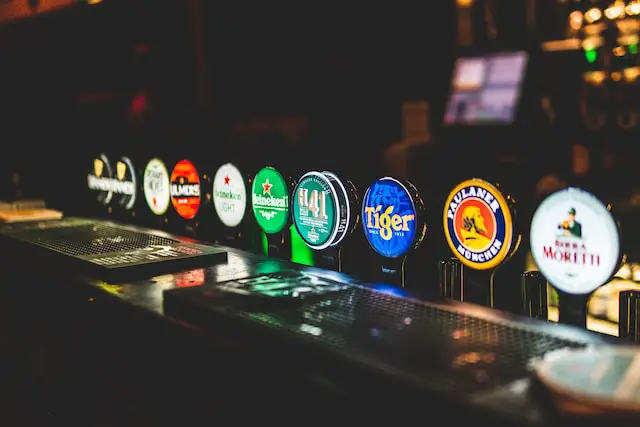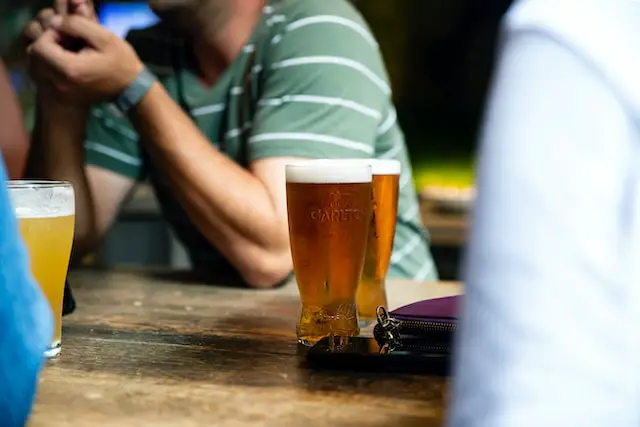Is it illegal to Bring Alcohol into a Bar
The allure of nightlife often revolves around the idea of enjoying a drink or two at a bar with friends or acquaintances. However, have you ever found yourself wondering about the legality of bringing your own alcohol into a bar? It’s a question that may not have crossed your mind until now, but understanding the legal boundaries can be crucial to ensuring a fun and trouble-free night out.
In this blog post, we will delve into the intriguing question: “Is it illegal to bring alcohol into a bar?” We’ll explore the intricate web of licensing laws, the variations in regulations from state to state, potential legal consequences, and even exceptions that may surprise you. By the end of this read, you’ll have a comprehensive understanding of the legal landscape surrounding this topic, empowering you to make informed decisions and enjoy your bar experiences responsibly. So, let’s raise a virtual toast to unraveling the mysteries of bringing alcohol into a bar and navigating the legal maze that surrounds it.
State And Local Variations

State and local variations in alcohol-related laws can significantly impact the legality of bringing alcohol into a bar. These variations often stem from the fact that alcohol regulation is primarily a matter of state law in the United States, with each state having its own set of regulations and licensing authorities. Additionally, local governments may impose additional rules and restrictions. Let’s delve into the complexities of state and local variations:
1. State-Level Variations
- Liquor Control States vs. License States: The U.S. is divided into liquor control states and license states. In liquor control states, the government controls the sale and distribution of alcoholic beverages, while in license states, private businesses can obtain licenses to sell alcohol. The rules for bringing alcohol into a bar can vary accordingly.
- Licensing Requirements: States have different requirements for obtaining licenses to serve alcohol. These requirements can range from background checks to specific training for staff.
- Hours of Service: States can have different laws regarding the hours during which bars can serve alcohol. Some states have extended hours while others have more restrictive hours of service.
- Minimum Drinking Age: While the legal drinking age in the U.S. is 21 nationwide, states may have variations in how they enforce this law and penalties for underage drinking.
2. Local Variations
- City and County Regulations: Local governments, such as cities and counties, often have the authority to impose additional regulations on bars. These can include restrictions on outdoor seating, noise levels, and operating hours.
- Zoning Laws: Zoning regulations can affect where bars are allowed to operate. Some areas may be designated as “dry” zones where alcohol sales are prohibited, while others may have specific zones for entertainment and nightlife.
- Special Permits: Local governments may issue special permits for events or festivals where bringing alcohol into a designated area is allowed. These permits often come with their own set of rules and restrictions.
- Noise and Nuisance Ordinances: Bars are frequently subject to noise and nuisance ordinances that can affect their operations. These ordinances may restrict live music, outdoor seating, and other activities that could disrupt the neighborhood.
Is Bringing Your Own Drink To A Bar Legal

Bringing your own alcoholic drink to a bar is generally not legal in most places, and it can result in various legal consequences. Bars are licensed establishments that are subject to strict regulations governing the sale and consumption of alcohol.
These regulations typically include provisions that prohibit patrons from bringing outside alcohol into the premises. Here are a few reasons why it’s usually not allowed:
- License Violation: Allowing patrons to bring their own alcohol into a bar can be a violation of the bar’s alcohol license. Bars are granted licenses to sell and serve specific types of alcohol to patrons, and bringing in outside alcohol can breach the terms of their license.
- Loss of Revenue: Bars rely on the sale of alcohol as a significant source of revenue. Allowing patrons to bring their own alcohol could result in a loss of sales for the establishment, which can impact their ability to operate profitably.
- Safety and Accountability: Bars have a responsibility to ensure the responsible consumption of alcohol on their premises. Allowing patrons to bring their own alcohol can make it difficult for the bar staff to monitor and control the amount of alcohol consumed, potentially leading to safety issues and overconsumption.
- Liability: If a patron becomes intoxicated by consuming their own alcohol brought into the bar and subsequently causes harm or accidents, the bar may still bear liability for not preventing overconsumption.
- Legal Consequences: Violating alcohol regulations can result in legal consequences for both patrons and bar owners. Patrons may face fines, legal charges, or even bans from the establishment. Bar owners may face penalties, fines, suspension, or revocation of their alcohol license.
Conclusion
In conclusion, the question of whether it’s legal to bring alcohol into a bar is not one to take lightly. Understanding the intricate web of licensing laws, state and local variations, and the potential legal consequences is essential for a responsible and enjoyable night out.
Licensing laws serve as the foundation upon which the legality of bringing alcohol into a bar is determined. These laws aim to strike a balance between promoting responsible alcohol consumption, ensuring public safety, and supporting licensed businesses. Violating these laws can result in severe legal consequences, including fines, criminal charges, and even the revocation of a bar’s license.
State and local variations add an additional layer of complexity to the issue. What may be permissible in one state or locality could be strictly prohibited in another. Therefore, it’s imperative to research and respect the specific laws and regulations in the area where you plan to visit a bar.
Is it illegal to Bring Alcohol into a Bar
The allure of nightlife often revolves around the idea of enjoying a drink or two at a bar with friends or acquaintances. However, have you ever found yourself wondering about the legality of bringing your own alcohol into a bar? It’s a question that may not have crossed your mind until now, but understanding the legal boundaries can be crucial to ensuring a fun and trouble-free night out.
In this blog post, we will delve into the intriguing question: “Is it illegal to bring alcohol into a bar?” We’ll explore the intricate web of licensing laws, the variations in regulations from state to state, potential legal consequences, and even exceptions that may surprise you. By the end of this read, you’ll have a comprehensive understanding of the legal landscape surrounding this topic, empowering you to make informed decisions and enjoy your bar experiences responsibly. So, let’s raise a virtual toast to unraveling the mysteries of bringing alcohol into a bar and navigating the legal maze that surrounds it.
State And Local Variations

State and local variations in alcohol-related laws can significantly impact the legality of bringing alcohol into a bar. These variations often stem from the fact that alcohol regulation is primarily a matter of state law in the United States, with each state having its own set of regulations and licensing authorities. Additionally, local governments may impose additional rules and restrictions. Let’s delve into the complexities of state and local variations:
1. State-Level Variations
- Liquor Control States vs. License States: The U.S. is divided into liquor control states and license states. In liquor control states, the government controls the sale and distribution of alcoholic beverages, while in license states, private businesses can obtain licenses to sell alcohol. The rules for bringing alcohol into a bar can vary accordingly.
- Licensing Requirements: States have different requirements for obtaining licenses to serve alcohol. These requirements can range from background checks to specific training for staff.
- Hours of Service: States can have different laws regarding the hours during which bars can serve alcohol. Some states have extended hours while others have more restrictive hours of service.
- Minimum Drinking Age: While the legal drinking age in the U.S. is 21 nationwide, states may have variations in how they enforce this law and penalties for underage drinking.
2. Local Variations
- City and County Regulations: Local governments, such as cities and counties, often have the authority to impose additional regulations on bars. These can include restrictions on outdoor seating, noise levels, and operating hours.
- Zoning Laws: Zoning regulations can affect where bars are allowed to operate. Some areas may be designated as “dry” zones where alcohol sales are prohibited, while others may have specific zones for entertainment and nightlife.
- Special Permits: Local governments may issue special permits for events or festivals where bringing alcohol into a designated area is allowed. These permits often come with their own set of rules and restrictions.
- Noise and Nuisance Ordinances: Bars are frequently subject to noise and nuisance ordinances that can affect their operations. These ordinances may restrict live music, outdoor seating, and other activities that could disrupt the neighborhood.
Is Bringing Your Own Drink To A Bar Legal

Bringing your own alcoholic drink to a bar is generally not legal in most places, and it can result in various legal consequences. Bars are licensed establishments that are subject to strict regulations governing the sale and consumption of alcohol.
These regulations typically include provisions that prohibit patrons from bringing outside alcohol into the premises. Here are a few reasons why it’s usually not allowed:
- License Violation: Allowing patrons to bring their own alcohol into a bar can be a violation of the bar’s alcohol license. Bars are granted licenses to sell and serve specific types of alcohol to patrons, and bringing in outside alcohol can breach the terms of their license.
- Loss of Revenue: Bars rely on the sale of alcohol as a significant source of revenue. Allowing patrons to bring their own alcohol could result in a loss of sales for the establishment, which can impact their ability to operate profitably.
- Safety and Accountability: Bars have a responsibility to ensure the responsible consumption of alcohol on their premises. Allowing patrons to bring their own alcohol can make it difficult for the bar staff to monitor and control the amount of alcohol consumed, potentially leading to safety issues and overconsumption.
- Liability: If a patron becomes intoxicated by consuming their own alcohol brought into the bar and subsequently causes harm or accidents, the bar may still bear liability for not preventing overconsumption.
- Legal Consequences: Violating alcohol regulations can result in legal consequences for both patrons and bar owners. Patrons may face fines, legal charges, or even bans from the establishment. Bar owners may face penalties, fines, suspension, or revocation of their alcohol license.
Conclusion
In conclusion, the question of whether it’s legal to bring alcohol into a bar is not one to take lightly. Understanding the intricate web of licensing laws, state and local variations, and the potential legal consequences is essential for a responsible and enjoyable night out.
Licensing laws serve as the foundation upon which the legality of bringing alcohol into a bar is determined. These laws aim to strike a balance between promoting responsible alcohol consumption, ensuring public safety, and supporting licensed businesses. Violating these laws can result in severe legal consequences, including fines, criminal charges, and even the revocation of a bar’s license.
State and local variations add an additional layer of complexity to the issue. What may be permissible in one state or locality could be strictly prohibited in another. Therefore, it’s imperative to research and respect the specific laws and regulations in the area where you plan to visit a bar.




